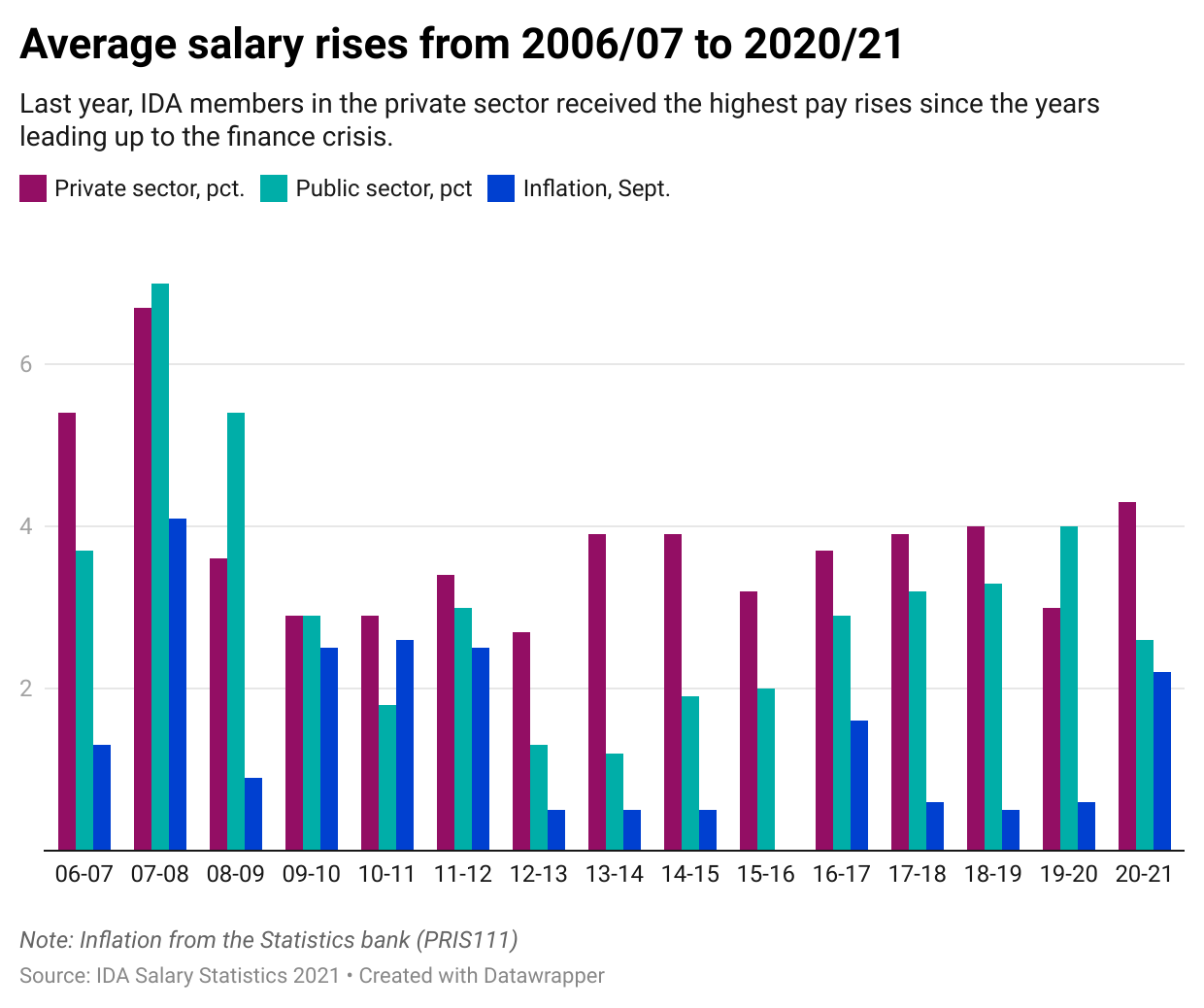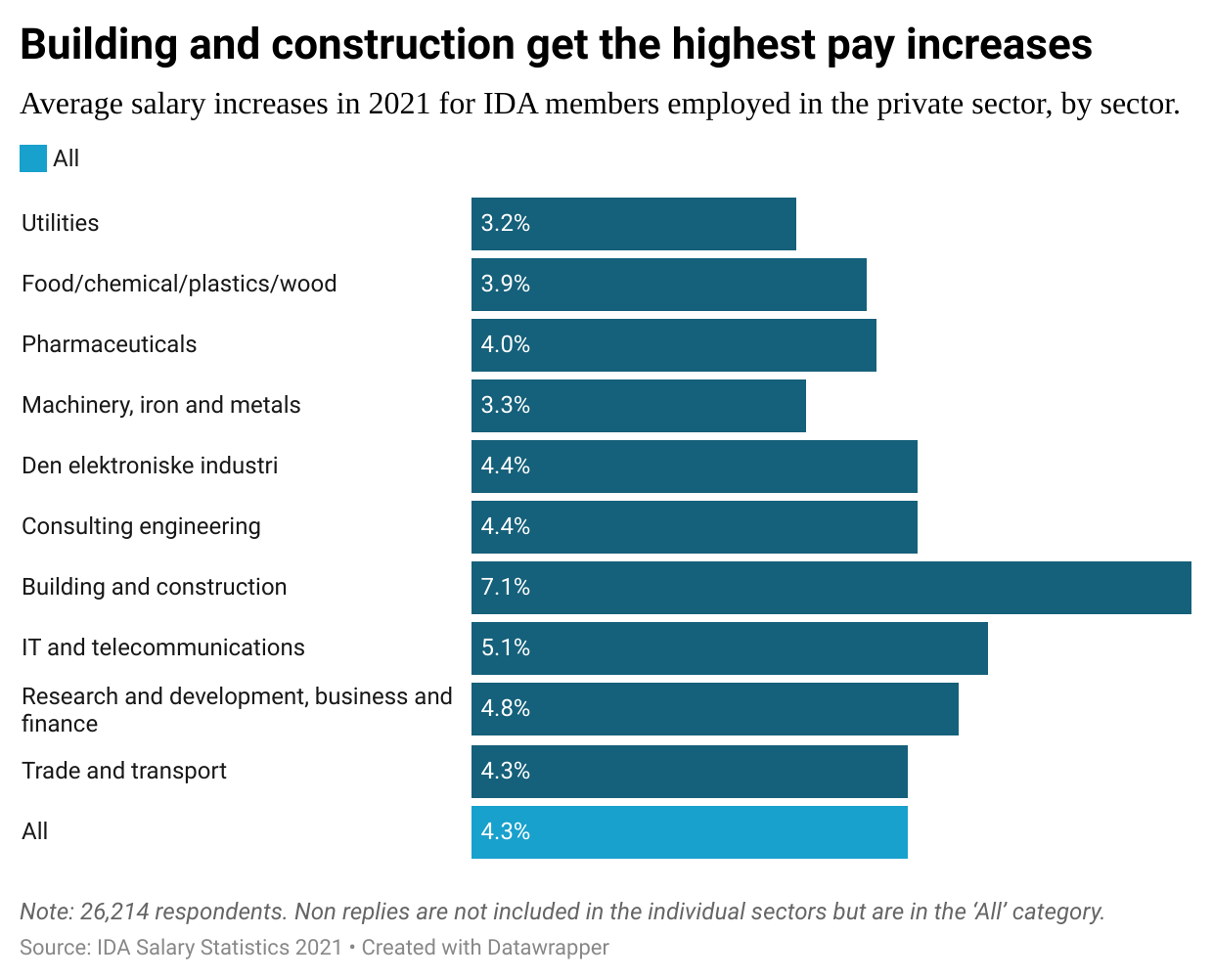Salary
Engineers get the highest pay increases since the financial crisis

Last year, pay increases were highest in the building and construction sector, with an average annual increase of almost 7.1%.
Week after week, there were stories in the media about the lack of qualified labour within a large number of sectors and industries. The shortage of labour also included engineers, MSc graduates and IT specialists.
It is no surprise, therefore, that members of IDA in the private sector also enjoyed good pay rises. On average, members in Denmark received an increase of 4.3%. Inflation was at 2.2% in the same period (September 2020 - September 2021).
Members employed by the state have received an increase of 2.3% on average, while those in the municipalities and regions have received 3.2% on average. In the same period as the statistics for the around 16,000 IDA members in the public sector (May 2020 - May 2021), inflation was at 1.7%.
“Engineers, natural science graduates and IT specialists are in much demand in a great many businesses. Unemployment is low, and the most recent forecast indicates that there will also be a demand for IDA members for some time to come. We aren’t educating anywhere near enough knowledge workers with STEM skills, and neither are we managing to attract and retain enough highly educated specialists from abroad. This is reflected in pay trends last year, with considerable increases in real terms for our members, especially in the private sector,” said Morten Thiessen, chairman of the Council of Employees at IDA.
The salary statistics show that the average salary increases vary somewhat from sector to sector. Last year, pay increases were highest in the building and construction sector, and for IT and telecommunications, with average annual increases of 7.1% and 5.1%, respectively.
"If you look around, it’s clear that business is booming in building and construction in Denmark. We know that labour in this sector is hard to find, and that there are many vacant positions. The same holds true for the IT sector. There’s also a pronounced shortage of knowledge workers, and this comes to light in salary developments,” said Morten Thiessen.
He predicts that the shortage of highly educated labour with STEM skills will also affect salary developments in the years to come.
“The negative consequences for employment of the corona pandemic have faded to nothing for our membership group. Furthermore, we can see that newly qualified engineers, MSc’s and IT graduates from last summer are finding jobs much quicker than those who graduated in the five foregoing years. This is impressive, and yet another indication that the labour market is booming for STEM graduates. There are many job openings and our legal advice department is receiving many employment contracts for review. Moreover, it seems that the good times will continue for as far into the future as we can see. On the other hand, as a production and knowledge society, this is a little disturbing for Denmark, as there are clear signs of bottlenecks in some sectors, and this is toxic for development and progress,” said Morten Thiessen.
He encourages companies with vacant positions, to sharpen their focus on employing new graduates and to look towards foreign graduates who have completed their education in Denmark and who want to stay here.
“There’s definitely something here with regard to the shortage of labour. I’d also urge companies to tackle the shortage of knowledge workers by looking at their older staff. We know that many older people are forced to leave the labour market involuntarily, simply because they have to retire when they reach a specific age. We can do things better, and this is where senior agreements are an obvious tool to maintain the most experienced people who want to stay in the labour market,” said Morten Thiessen.


Compare your salary
The IDA Salary Statistics 2021
IDA’s Salary statistics shows what IDA members with different profiles earn on average. Please take this data tool into account as way to be well prepared for your next salary negotiation.